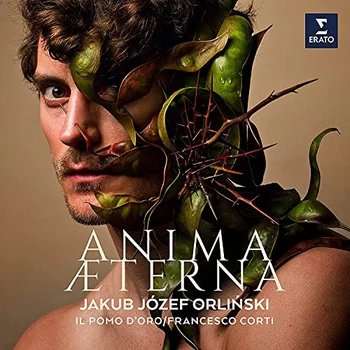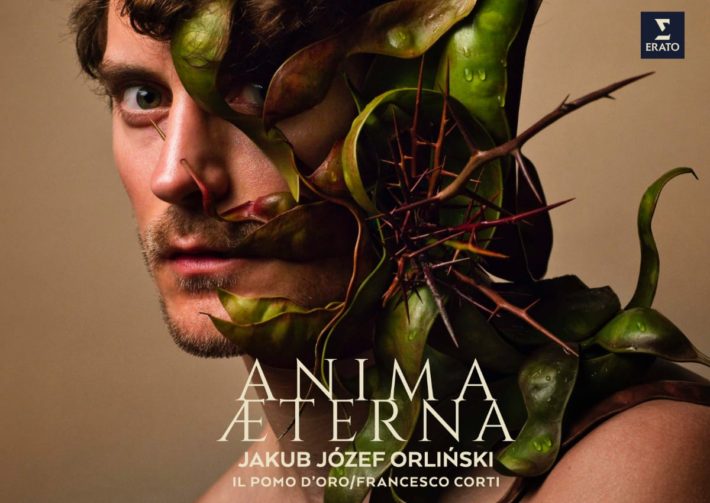Jakub Józef Orliński’s third solo album continues a partnership with Il pomo d’Oro (this time led by guest conductor Francesco Corti) and musicologist Yannis François. The first two recordings, which have met with almost universal acclaim, feature Baroque repertoire, some of it well-known, along with several world premieres. The same approach is readily apparent here. There is also a wonderful sense of collaboration, Orliński and orchestra joined by a choir and soprano Fatma Said.

The recital opens with a riveting performance of Zelenka’s “Barbara, dira, effera.” Written for castrato Domenico Annibali, newly arrived at the Dresden court, this music is a virtuosic tour de force for both soloist and orchestra. Orliński interpretation is boldly dramatic, with expertly sung coloratura. The music’s wide angular leaps are dispatched with unerring accuracy and impeccable tuning. Moreover, both orchestra and soloist create a thrilling immediacy that grabs the listener and never lets go. This is writing meant to showcases brilliant technique, and Orliński makes it seem almost easy – a brilliant opener.
Fux’s “Non t’amo per il ciel” follows, and offers a completely different experience, giving us an opportunity to luxuriate in Orliński’s finely spun legato. His lush tone and superb breath control are used to fully express the emotion of each phrase. “Laetatus sum,” also by Zelenka, was written for soprano, alto and orchestra. Here Orliński partners with Fatma Said, recent winner of the Opus Klassik “Young Artist of the Year” award for her debut album “El Nour” (see our review here). They are well matched in vocal color and weight, and they are particularly beautiful in capturing the desire for peace expressed in the motet’s third movement (Rogate, track 7). While not as overtly showy as the previous motet, this music still has several technical challenges, which both singers have fully mastered (for example, listen to how effortlessly Said handles the high tessitura of the motet’s second movement).
Bartolomeo Nucci’s aria “Un giusto furore” is one of two world premieres on the album. Musicologist Yannis François believes this may well be the first time any of Nucci’s music has been recorded. The aria is a stirring joust between trumpet and voice – it could not receive better advocacy than the performance heard here. Surely Nucci is a composer whose music deserves to be heard.
The other premiere, Gennaro Manna’s “Laudate pueri,” is a substantial, almost 20-minute motet for alto, choir and orchestra that looks forward to the early church music of Haydn and Mozart. Orliński’s willingness to record repertoire in which he is a first among equals is notable and delightful; there is a palpable sense of joy and commitment to the performance that again shows this music in the best possible light.
Indeed, a key ingredient to the success of this recording (as well as the two previous albums) is the orchestra. Unlike many period bands that strive for a refined and blended sonority, Il Pomo d’Oro positively revels in the heterogenous, ripe and plummy timbre of their instruments. Throughout the recital there are several moments of solo orchestral playing: the trumpet solo mentioned above, or the fabulous bassoon playing heard in the opening track. Solo work always has plenty of character, while the ensemble offers sensitive, nuanced accompaniments that give Orliński all the room he needs to shape the music with an almost improvisational freedom. Sample how well these forces work together in the gorgeous aria “Giusto Dio” (track 11), the orchestra heightening and enriching Orliński’s emotive, deeply felt performance. In short, the orchestra is fully integral to the textual and emotional expression of each selection.
Orliński’s introductory note is as passionate and enthusiastic as his singing, and the liner notes by Yannis François are informative and engaging. Erato’s sound is excellent, its immediacy allows for plenty of clarity, but there is enough room ambiance to add warmth to the overall sound. Eighty minutes of riveting music making: we can only hope that these forces will partner again for further explorations of Baroque repertoire. Urgently recommended.
Recommended Comparisons
Orliński | Mehta | Holliger | DiDonato
Anima Aeterna
Jakub Józef Orliński – Countertenor
Il Pomo d’Oro & Francesco Corti – Conductor
Erato, CD 9029500570



















